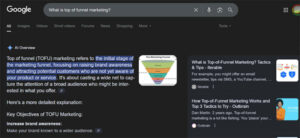PHILIPPINE BRANDS should tailor their online content to align with artificial intelligence (AI)-driven search algorithms to stay visible in an increasingly competitive digital landscape, according to digital marketing firm Truelogic, Inc.
“We have come to a period when brands are going to have to create content to satisfy the learning objective of the bot, so that the bot will feature them,” said Bernard N. San Juan III, managing partner at Truelogic, told BusinessWorld via Zoom.
He noted that while brands should still focus on creating top-funnel content aimed at building awareness and attracting potential customers, the structure of this content should be more competitive and engaging than that of their rivals, he added.
Mr. San Juan said AI has complicated top-of-funnel marketing, which is traditionally focused on engaging and educating potential customers during the awareness phase of the buying journey.
“If they’re not producing that [kind of content], their potential customer is getting intercepted at the AI level by their competing brand, not them,” he pointed out.
He also cited the impact on the bottom funnel, where leads are near the purchasing stage. Failure to optimize for AI in the top funnel could result in lost sales opportunities downstream, he added.
“The brand has to get concerned when they realize that losses in the top funnel are affecting the bottom funnel,” he said.
Since the launch of Google Search’s AI Overviews feature last year, businesses have been compelled to reassess how they approach online visibility.
The feature, which generates summaries above traditional search results, is rapidly gaining traction. A recent Truelogic study found that AI Overviews now appear in 13% of Google searches, up from 6.5% earlier in the year.
Mr. San Juan said brands that use clear, straightforward language — free from jargon — are more likely to be featured in these AI-generated summaries.
“Right now, most people are interacting with the AI at the ninth-grade level — that’s the level of language that we’re using with the AI,” he said. “So, it will look for that [kind of] language to satisfy questions.”
Truelogic’s study also found that brands cited in Google’s AI Citations — direct references and hyperlinks included in AI Overviews — tend to experience an increase in web traffic.
“The problem with brands is that they’re using so much legalese, and the AI does not like that,” he said, noting that complex language could hinder a brand’s chances of being featured in AI-generated content.
To help brands improve their digital presence, Truelogic has launched a search optimization service aimed at improving brand visibility through AI search algorithms. Mr. San Juan predicts that brands using this service could see a 10% increase in feature snippets and citation volume.
Despite the potential benefits for brands, Google’s AI Overviews have faced criticism, particularly from publishers.
The Independent Publishers Alliance recently filed an antitrust complaint against Google, accusing the company of misusing web content to the detriment of independent publishers’ readership, traffic and revenues.
The group said publishers are unable to opt out of having their content used in AI summaries.
As AI continues to reshape search engine results, Mr. San Juan advised brands to regularly archive and update outdated information to avoid what is known as AI “hallucinations” — inaccurate or misleading AI-generated content.
Erroneous information affects brand integrity, he said, citing the importance of maintaining accurate and current content online. — Beatriz Marie D. Cruz

